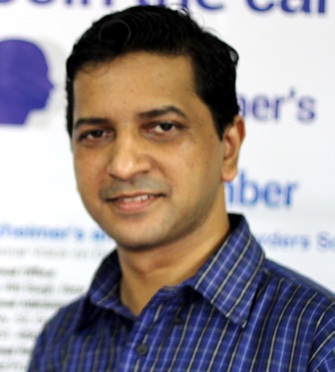It is more imperative for us to talk about people with dementia and their caregivers in the time of the Covid-19 crisis

While the entire world has shifted its focus on the growing Covid pandemic, let us not forget people with Alzheimer’s disease and their families on World Alzheimer’s Day, September 21. People with dementia are particularly vulnerable to Covid due to their age, multimorbidity and inability to remember and follow precautions for prevention.
The theme this year ‘Let’s Talk about Dementia’ has become pertinent in the time of the pandemic and it is more imperative for us to talk about people with dementia and their caregivers.
Everyone should be aware of the 10 warning signs of dementia. Memory problems and confusion in the elderly could be a sign of a disease and one must seek help from a physician. These 10 warning signs are recent memory loss, difficulty in performing familiar tasks, poor or decreased judgement, misplacing things, disorientation in time/place, problems in language, problems keeping track of things, changes in mood/behaviour, trouble with images and withdrawal from social activities.
An estimated 50 million people have dementia around the world and the number is projected to increase to 152 million by 2050.
Dementia in Goa
In a small state like Goa, there are an estimated 5,000 people living with dementia. People often feel that this is normal ageing and neglect this condition. There are an estimated 4 million people with dementia in India. Due to stigma and lack of awareness, over 90 per cent of the people with dementia in India do not get a diagnosis and find it difficult to cope up with the complex brain condition.
The Covid lockdown has affected the elderly and many of them are confined to their homes and this is even worse for those with dementia. For some caregivers in Goa, the lockdown gave caregivers an opportunity to spend quality time with their loved ones. There were others who were separated from family and this increased the carer stress, loneliness and behavioural problems. Technology has come to the rescue in the pandemic, reaching out to people with a problem and continue with the benefits of cognitive stimulation. The Memory Café for seniors in Panaji and Miramar shifted its focus from face-to-face meetings for promoting cognitive health to sharing and solving puzzles and word games on WhatsApp to exercise the brain. People with dementia may sometimes struggle to adhere to measures to reduce virus transmission, as they might not understand or remember about required changes to behaviour, such as physical distancing and hygiene, leading to increased risk to themselves and their careers. They might additionally be vulnerable if they depend on others for daily activities or personal care, as this necessitates close personal contact.
The World Alzheimer’s Day is being observed in Goa for the 20th year. As people live longer due to an improved economy and better medical care, the proportion of older people is on the rise. With this, we notice a rise in people with dementia.
While we think of people affected with this condition on World Alzheimer’s Day, we should also talk about caregivers who tirelessly look after people with dementia and often suffer from caregiver stress and burnout. In our study in Goa, we found almost 80 per cent of caregivers were women and 50 per cent of them were spouses who were old themselves and also had other health conditions.
Dementia and memory lapse
We need to understand that all memory loss in the elderly is not dementia. Sometimes, we forget the names of people we met a few days ago and totally blank out when we see a face, all this could be normal. The fundamental difference between age-related forgetfulness and dementia is that age-related memory loss is not disabling and does not affect daily activity.
In contrast, dementia is characterised by a progressive persistent decline in intellectual ability such as memory, language, abstract thinking and judgement. The simple message is that if you notice memory problems in the elderly, please consult a doctor. Imagine a room with a million light bulbs and some of them slowly switch off. At first, you may not even notice as the room will still be bright. However as more light bulbs go off, you will realise that something is wrong and if you do not do anything, you may slip into total darkness. This is what Alzheimer’s disease does to a person. Early detection and appropriate care can help improve quality of life of those with dementia and also prepare caregivers for better management.
Prevention of dementia
The recent landmark research paper published in the Lancet showed that 12 risk factors contribute to 40 per cent of people with dementia and, therefore, a targeted approach at risk reduction can potentially delay or protect a significant number of people from getting dementia.
Even the possibility of delaying the onset of dementia by a few years can have a great impact on quality of life and cost of care. There is a huge difference if someone develops dementia at the age of 60 as compared to 80.
The formula is not complex, but needs a multi-sectorial approach. One needs to increase education, physical activity and social contact, as they tend to protect an individual against Alzheimer’s disease and dementia.
People must decrease high blood pressure, obesity, smoking, depression, diabetes, excessive use of alcohol, hearing loss and air pollution, as they are known to be risk factors for dementia.
While the scientific community tries to find a cure to dementia, let us do our bit in raising awareness about the condition, contribute to developing a dementia-friendly community and stay free from dementia as far as possible by adopting a healthy lifestyle.